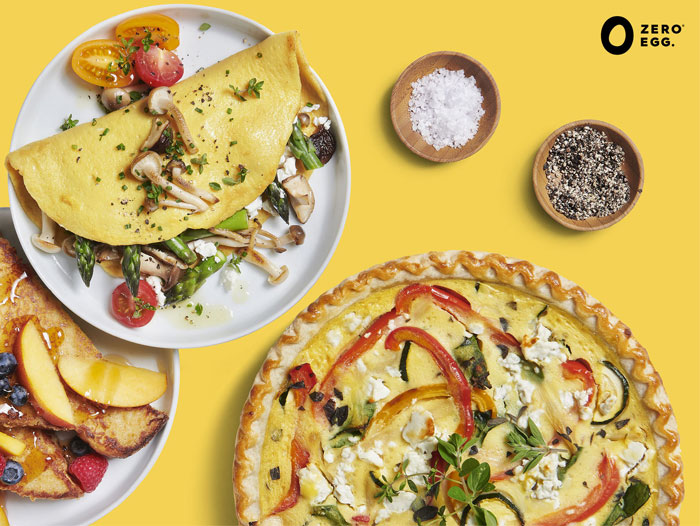Zero Egg Cracks U.S. Plant-Based Foodservice Market
October 8, 2020 | 5 min to read

SAN FRANCISCO — As demand for alternatives to animal products is at an all-time high among omnivores, vegetarians, and vegans alike, Zero Egg, is cracking the U.S. market by boldly taking over the decades-old traditional World Egg Day on October 9 to introduce the first plant-based egg replacement that tastes, looks, and functions like an ordinary egg, but is entirely made with plants.
Now available to all U.S. foodservice operators and food manufacturers, Zero Egg offers two products, “EGG Basics,” crafted to rival ordinary eggs in traditional egg entrees and breakfast dishes, and “BAKE Basics,” developed for specialty baking. Both products come in powder form with high yields that offer efficient, safe handling and storage, and a reliable and cost-effective solution.
“Zero Egg is a game-changer because we are working with major foodservice players and food manufacturers to transform the industry by not only making plant-based food more accessible, but the norm,” said Liron Nimrodi, CEO, and co-founder, Zero Egg. “Designed with a clean taste and a texture to be used in a wide variety of dishes where eggs are traditionally used, Zero Egg offers increased flexibility and affordability.”
Nimrodi co-founded the company in 2018 in The Kitchen FoodTech Hub, a FoodTech seed investor and tech incubator in Israel, to meet growing consumer demand for an egg replacement for the foodservice industry that was effective, nutritious, kind to animals and the planet, while being operationally sustainable.
Last year plant-based food sales climbed five times faster than overall U.S. retail food sales, according to The Good Food Institute, and 2020 SPINS retail sales data shows grocery sales of plant-based foods that directly replace animal products have grown 29 percent in the past two years to $5 billion.
“We’re launching ‘the egg for everyone’ on World Egg Day to crack old food paradigms and proudly demonstrate that Zero Egg is the best choice as the only plant-based egg that does it all,” said natural products industry veteran Isabelle Francois, general manager, Zero Egg North America. “We’ve seen a huge shift in vegan meat, milk, and cheese offerings at full service and fast-casual restaurants, especially among the flexitarian crowd. Now it’s time to not only disrupt the plant-based egg category, but to become the leader of it by offering the most ethical, tasty, versatile, and economical egg alternative on the market.”
Zero Egg is based on a unique blend of plant proteins, including soy, potato, pea, and chickpea proteins. It brings the power of plant-based to the health-conscious consumer from a nutritional standpoint with no cholesterol, low fat and low-calorie benefits (only 15 calories per egg substitutes compared to the average 68 calories of an actual egg).
“Zero Egg is like nothing I have seen in my career,” said Mario Rodriguez, executive chef, Zero Egg. “By simply mixing the powder with water and oil, you can use it to make scrambles, omelets, quiches, French toast, waffles, cookies, sauces, among many other dishes. It’s ready to use in minutes and can be made and stored in large batches, so it’s perfect for busy breakfast rushes and ideal for food manufacturers looking to create and launch new animal-friendly items.”
The product is manufactured in Cookeville, Tennessee, and the company has partnered with Gordon Food Service for distribution. Zero Egg plans to launch a consumer version at the retail level next year, and has secured investments from Unovis Asset Management-New Crop Capital, Strauss Group-TheKitchen Hub, and Valor Siren Ventures.
“The pent-up demand for plant-based eggs is huge and Zero Egg is uniquely positioned to satisfy the needs of foodservice and retail operators given its functionalities, taste, and competitive pricing,” said Dan Y. AltschulerMalek, managing director at Unovis Asset Management-New Crop Capital and Zero Egg board member. “One hundred billion eggs are sold each year in the U.S.
alone, just think of the impact if just 10 percent of them were replaced with Zero Egg, which is not only ethical and less expensive but also super delicious.”
Zero Egg’s mission is to empower the era of sustainable foods as it uses radically less land, water, and energy and produces significantly less greenhouse gas emissions than its animal analog. For comparison purposes, it takes 636 gallons of water to produce a dozen ordinary eggs. It takes 93 percent less water to produce the equivalent of a dozen plant-based eggs with Zero Egg.
About Zero Egg:
Animal friendly, sustainable, and a healthier alternative, Zero Egg is the plant-based egg for everyone. Founded in 2018, the company believes the plant-based egg should be an everyday choice and is on a mission to make plant-based food accessible to everyone. With a feather-light footprint, Zero Egg offers the taste and texture of an ordinary egg, has better-for-you attributes, and is easy on the planet. Zero Egg is determined to meet the growing demand for egg alternatives that taste, cook, and function like traditional eggs, specifically in foodservice and food manufacturing. In addition to the U.S. Zero Egg is also distributed in Israel and Europe. The company received early accolades at launch, including Calcalist’s 2019 Food Innovation competition in Israel. More
at www.zeroeggfood.com, Instagram and LinkedIn.
